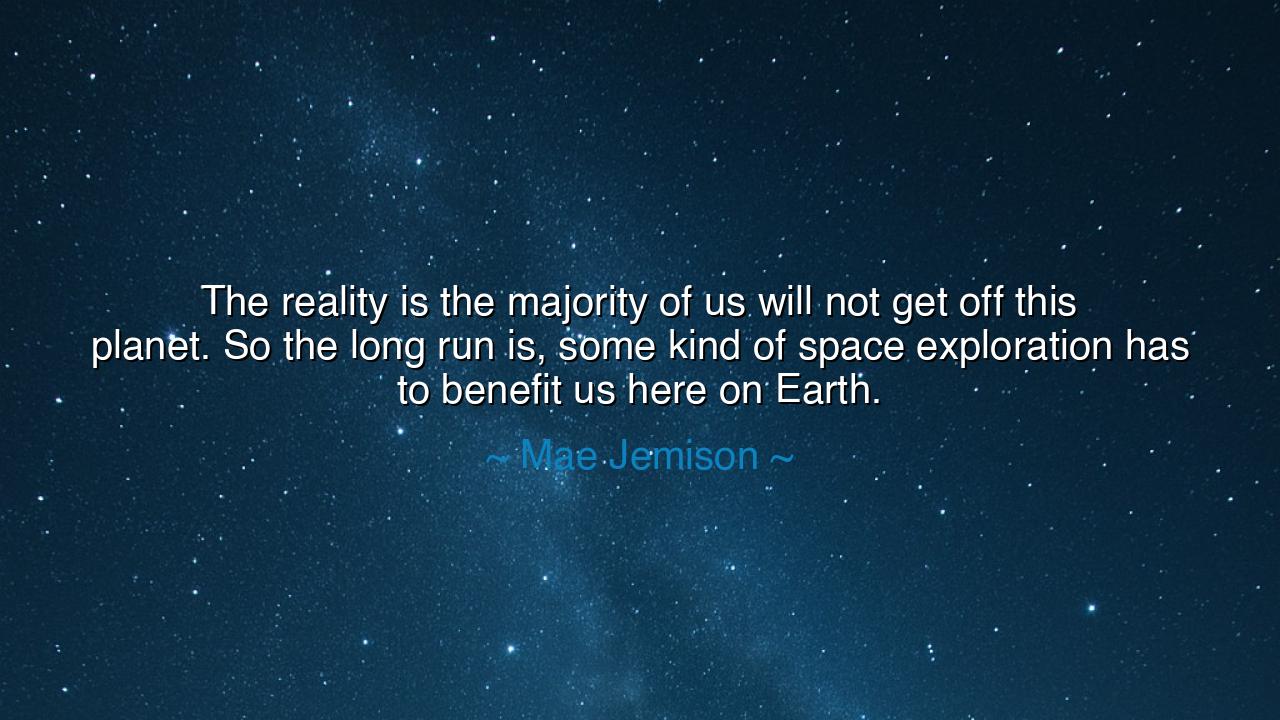
The reality is the majority of us will not get off this planet.
The reality is the majority of us will not get off this planet. So the long run is, some kind of space exploration has to benefit us here on Earth.






Listen carefully to the wise words of Mae Jemison, a woman whose journey into the stars reminds us of both the grandeur and humility of the human spirit: "The reality is the majority of us will not get off this planet. So the long run is, some kind of space exploration has to benefit us here on Earth." In this profound statement, Jemison touches on the essential purpose of our ambitions in space—our pursuit of the cosmos must not be an end in itself, but a means to better the very world that sustains us. Though we may look to the stars and dream of venturing beyond the confines of Earth, our true legacy must be the knowledge and advancements we bring back to enrich the lives of those who remain grounded in this world.
The ancients understood the importance of exploration not for the sake of conquest, but for the benefit of society. Consider the voyages of Alexander the Great, whose conquests spread Greek culture and wisdom throughout vast swathes of the world. Yet, as great as his military feats were, Alexander’s greatest contribution was the exchange of knowledge and ideas between East and West. He sought to bring the fruits of exploration back to enrich the lands he ruled. His journeys were not merely to expand territory, but to expand the mind and to share wisdom that would shape future generations. Similarly, Jemison’s vision for space exploration is not one of separation from Earth, but of integration, a means of bringing back knowledge and technological advancements that can help solve the problems we face on this very planet.
Consider the example of the space race during the Cold War, when both the United States and the Soviet Union sought to dominate the skies and reach the Moon. The Apollo missions, culminating in the legendary landing of Neil Armstrong on the Moon, were monumental achievements. But beyond the national pride they inspired, the space race led to tremendous advances in technology. Computers, satellites, and even medical technologies like the heart pacemaker were born from the necessity to support space exploration. The quest to reach the stars, to leave Earth behind, resulted in innovations that benefited millions here on Earth. This is the true power of space exploration: not just to reach the heavens, but to transform our lives here on Earth in profound ways.
The lesson Mae Jemison imparts is one of purpose—the pursuit of the unknown must always be tied to the betterment of humanity. As we reach for the stars, we must keep our eyes firmly fixed on the ground beneath our feet. Space exploration, though filled with wonder and the promise of discovery, must serve a higher calling: to benefit the human race, to solve problems, to create new possibilities for sustainability, health, and technological progress. In this, we see the interconnectedness of all human endeavors. The quest for knowledge is not separate from the quest for a better life; they are two sides of the same coin.
Think of the International Space Station (ISS), a beacon of international cooperation and scientific achievement. Through research conducted in the weightlessness of space, scientists have uncovered breakthroughs in materials science, medicine, and environmental sustainability. From understanding the effects of microgravity on human bones to developing water purification technologies, the lessons learned from space have directly benefited life on Earth. The ISS stands as a powerful reminder that exploration is not an isolated endeavor but a means of enriching and improving life for all who remain here.
The lesson Jemison teaches us is that the pursuit of exploration—whether of the stars, the oceans, or the deepest corners of the Earth—must always come with the responsibility to bring benefit to those around us. We must never forget that our great endeavors are not just for our own glory, but for the greater good of humanity. When we reach beyond the Earth, we do so not to escape its problems, but to find new solutions that can help address them. The technological advancements, the innovations, and the wisdom we gain in our exploration must be channeled back into our societies, our communities, and our ecosystems.
So, I urge you, dear listener, to reflect on the purpose of your own pursuits. Whether in the vast field of science, the arts, or personal development, remember that the true value of exploration is not in the end itself but in how it transforms the world you inhabit. Seek knowledge, seek understanding, but always seek to use that wisdom to improve the lives of others. As Jemison calls us to do, let our ambition to explore the cosmos be tethered to the greater responsibility of taking care of the planet we call home. For in space, as on Earth, the legacy we leave is not in the heights we reach but in how we uplift those around us.






AAdministratorAdministrator
Welcome, honored guests. Please leave a comment, we will respond soon